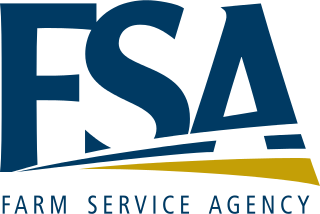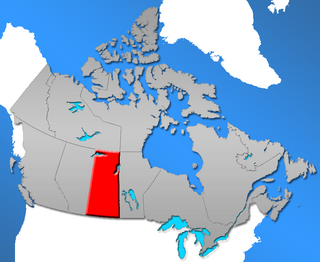
The International Finance Corporation (IFC) is an international financial institution that offers investment, advisory, and asset-management services to encourage private-sector development in less developed countries. The IFC is a member of the World Bank Group and is headquartered in Washington, D.C. in the United States.

The Federal Farm Loan Act of 1916 was a United States federal law aimed at increasing credit to rural family farmers. It did so by creating a federal farm loan board, twelve regional farm loan banks and tens of farm loan associations. The act was signed into law by President of the United States Woodrow Wilson.

The Business Development Bank of Canada is a Crown corporation and national development bank wholly owned by the Government of Canada, mandated to help create and develop Canadian businesses through financing, growth and transition capital, venture capital and advisory services, with a focus on small and medium-sized enterprises.

The Farm Service Agency (FSA) is the United States Department of Agriculture agency that was formed by merging the farm loan portfolio and staff of the Farmers Home Administration (FmHA) and the Agricultural Stabilization and Conservation Service (ASCS). The Farm Service Agency implements agricultural policy, administers credit and loan programs, and manages conservation, commodity, disaster, and farm marketing programs through a national network of offices. The Administrator of FSA reports to the Under Secretary of Agriculture for Farm Production and Conservation. The current administrator is Zach Ducheneaux. The FSA of each state is led by a politically appointed State Executive Director (SED).
Saskatchewan Government Insurance (SGI) is a Canadian insurance company and a Crown corporation wholly owned by the Government of Saskatchewan. SGI's operations consist of the Saskatchewan Auto Fund, the compulsory public auto insurance program for Saskatchewan, and its property and casualty insurance division sells additional automobile and property insurance products in five Canadian provinces under the trade name SGI Canada.

ATB Financial is a financial institution and Crown corporation wholly owned by the province of Alberta, the only province in Canada with such a financial institution under its exclusive ownership.
The Commodity Credit Corporation (CCC) is a wholly owned United States government corporation that was created in 1933 to "stabilize, support, and protect farm income and prices". The CCC is authorized to buy, sell, lend, make payments, and engage in other activities for the purpose of increasing production, stabilizing prices, assuring adequate supplies, and facilitating the efficient marketing of agricultural commodities.
HSBC Finance Corporation is a financial services company and a subsidiary of HSBC Holdings. It is the sixth-largest issuer of MasterCard and Visa credit cards in the United States. HSBC Finance Corporation was formed from the legal entity that had been known as Household International—shortly after Household International settled for US$486 million in charges pertaining to predatory lending, after burning through $389 million in legal fees and expenses—and is now expanding its consumer finance model via the HSBC Group to Brazil, India, Argentina and elsewhere.
A loan guarantee, in finance, is a promise by one party to assume the debt obligation of a borrower if that borrower defaults. A guarantee can be limited or unlimited, making the guarantor liable for only a portion or all of the debt.
The Farm Credit System (FCS) in the United States is a nationwide network of borrower-owned lending institutions and specialized service organizations. The Farm Credit System provides more than $343 billion in loans, leases, and related services to farmers, ranchers, rural homeowners, aquatic producers, timber harvesters, agribusinesses, and agricultural and rural utility cooperatives.

Canada is one of the largest agricultural producers and exporters in the world. As with other developed nations, the proportion of the population agriculture employed and agricultural GDP as a percentage of the national GDP fell dramatically over the 20th century, but it remains an important element of the Canadian economy. A wide range of agriculture is practised in Canada, from sprawling wheat fields of the prairies to summer produce of the Okanagan valley. In the federal government, overview of Canadian agriculture is the responsibility of the Department of Agriculture and Agri-Food.

The Co-operators Group Limited is a Canadian insurance co-operative, founded in 1945, owned by 46 members including co-ops, credit union centrals and representative farm organizations. It is one of the leading Canadian-owned multi-line insurers, offering auto, home, life, farm, travel and commercial insurance as well as investments. The company was started by farmers in Saskatchewan, in 1945.

The Alberta Heritage Savings Trust Fund(HSTF) is a sovereign wealth fund established in 1976 by the Government of Alberta under then-Premier Peter Lougheed. The Heritage Savings Trust Fund was created with three objectives: "to save for the future, to strengthen or diversify the economy, and to improve the quality of life of Albertans." The operations of the Heritage Savings Trust Fund are subject to the Alberta Heritage Savings Trust Fund Act and with the goal of providing "prudent stewardship of the savings from Alberta's non-renewable resources by providing the greatest financial returns on those savings for current and future generations of Albertans." Between 1976 and 1983 the Government of Alberta deposited a portion of oil revenue into the fund. The Heritage Savings Trust Fund used oil revenues to invest for the long term in such areas as health care, education and research and as a way of ensuring that the development of non-renewable resources would be of long-term benefit to Alberta. The strategy and goals of the fund have changed through successive provincial governments which moved away from direct investments in Alberta to a diversified approach, which now includes stocks, bonds, real estate and other ventures.
Crown corporations in Canada are government organizations with a mixture of commercial and public-policy objectives. They are directly and wholly owned by the Crown.
The Federation of Sovereign Indigenous Nations (FSIN), formerly known as the Federation of Saskatchewan Indian Nations, is a Saskatchewan-based First Nations organization. It represents 74 First Nations in Saskatchewan and is committed to honouring the spirit and intent of the Numbered Treaties, as well as the promotion, protection and implementation of these promises made over a century ago.
The Canada Pension Plan Investment Board, operating as CPP Investments, is a Canadian Crown corporation established by way of the 1997 Canada Pension Plan Investment Board Act to oversee and invest the funds contributed to and held by the Canada Pension Plan (CPP).

The Ministry of Highways is divided into the Operations, Policy and Programs, and Corporate Services Divisions and the Communications Branch. The ministry is the employer of over 1,476 employees diversified amongst 105 communities in Saskatchewan. The current Minister of Highways and Infrastructure is Jeremy Cockrill.

Historically, Saskatchewan's higher education system has been "significantly shaped" by demographics. In 1901, six years prior to the 1907 founding of a university in Saskatchewan, the urban population in Saskatchewan was 14,266 (16%) while the rural population was 77,013 (84%). One hundred years later, the proportions had changed significantly: urban population in 2001 was 629,036 (64%) while the rural population was 349,897 (36%). Over time the province's higher education system has changed significantly in response both to this demographic shift and to provincial politics.
The economy of Saskatchewan has been associated with agriculture resulting in the moniker "Bread Basket of Canada" and Bread Basket of the World. According to the Government of Saskatchewan, approximately 95% of all items produced in Saskatchewan, depend on the basic resources available within the province. Various grains, livestock, oil and gas, potash, uranium, wood and their spin off industries fuel the economy.
The Ministry of Agriculture is responsible for government programs associated with agriculture in the province of Saskatchewan, Canada. William Richard Motherwell was the first Saskatchewan Minister of Agriculture from 1906-1917.









